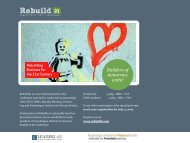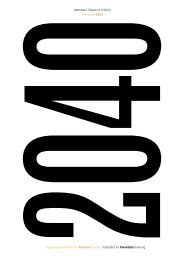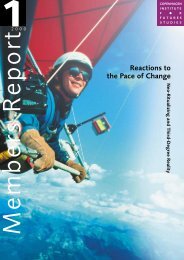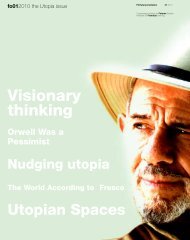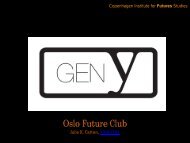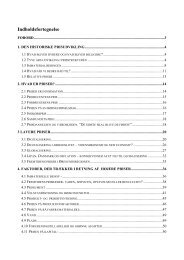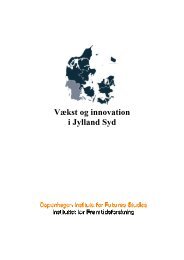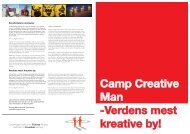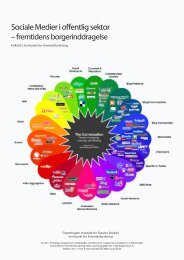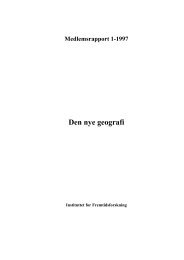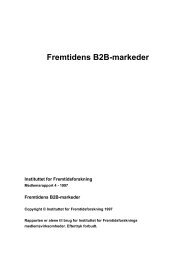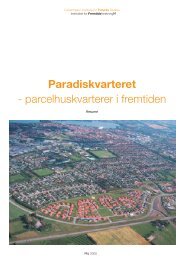Branding.
Branding.
Branding.
You also want an ePaper? Increase the reach of your titles
YUMPU automatically turns print PDFs into web optimized ePapers that Google loves.
12<br />
The precise future to come may not be represented by any of these scenarios,<br />
but they provide an opportunity to look for indicators and evaluate the possible<br />
consequences for the reader's company. Metaphorically speaking, the scenario<br />
approach invites to seeing the future as a range. The scenarios span this range.<br />
It is the range itself that is interesting, rather than the individual scenarios.<br />
Where should we move in it? Where do we wish to be situated? This is a strategic<br />
choice in each company - not a question of prediction.<br />
All the scenarios are based on three megatrends, which are described below.<br />
However, the connection to branding as a phenomenon is far from simple for<br />
these megatrends. For instance, the fact that the media situation is changing because<br />
of computer technology may not lead to qualitative changes. The essence<br />
of branding can in principle be constant though the possibilities for communication<br />
change. The megatrends we have used interact with the chosen uncertainty<br />
factors. The scenarios thus tell different stories about how society reacts to the<br />
development that takes place in the present. Society is complex and will remain<br />
so in the future. With the scenarios, we present four simplified images.<br />
MEGATREND: PERVASIVE COMPUTING<br />
The new generation of computer technology; also called 'ubiquitous computer technology'. The progression towards pervasive<br />
computing is a reality. The question is how the technology is implemented in the four scenarios and how it will influence<br />
our behaviour. Pervasive computing is characterised by being built-in, specialised and often not visible. In this report, it is<br />
generally described in two versions:<br />
Wearable Computing: Using computers that are physically smaller than traditional ones, but more specialised in their<br />
function. They are easy to integrate and are often hidden in traditional items like wristwatches or clothing. Wearable<br />
Computers (WC) are personal tools that often use wireless technology and communication through satellites. An example<br />
from 2003 is the wearable Mp3 player.<br />
Embedded Computing: Built-in computer technology in public and private spaces, buildings and larger tools. In this case<br />
the technology usually isn't personal, but can be used by different users. The computer becomes a part of the physical environment<br />
and becomes more or less hidden. A current vision of the home of the future has e.g. voice-controlled locking<br />
mechanisms and digital refrigerators.<br />
Source: Ingrid Haug: "Det usynlige vidunder - en filosofisk og æstetisk undersøgelse af pervasive computing" 2003<br />
MEGATREND: STIGENDE FORANDRINGSHASTIGHED<br />
More technological, commercial and social innovations are made per time unit today that ever before. The pace of change is<br />
increasing, and the goal of a large part of the developments is to improve the human condition. It is a great degree of freedom<br />
to be able to work long distance from Isle of Wight even though you work for a London-based company. To be able to<br />
take food out of the freezer and heat it in a minute in the microwave. To find your way in the emptiest of places with your<br />
car's GPS navigation system. The picture is clear: we want to both get more out of our time and to be increasingly in control<br />
of it. At the same time our field of attention is expanded through technology, IT and global media coverage, so that today we<br />
are informed about of the changes than we used to be. Often this is also a necessity in order to deal properly with social life<br />
and work.<br />
The fly in the ointment is that the developments often give us less time. We continually have to get acquainted with new<br />
things. Qualities like 'experienced' and 'practised' lose their significance. 'Adaptability' and 'flexibility' are the new requirements.<br />
The question is what the pace of change and the complexity will do to us. Will time become an expense or a goal?<br />
How is the general ensured in the face of the specific?<br />
MEGATREND: GLOBALISATION<br />
Globalisation is a concept with many different interpretations. The different perceptions contain one or more of the following<br />
descriptions with different weights: 1) An increasing number of global companies that operate on international markets with<br />
global strategies and global products. 2) Liberalisation of international trade and the emergence of new countries exporting<br />
industrial products, toughening the competition for the developed capitalist countries. 3) The technological revolution in<br />
communication and transportation that has made quick contact with all parts of the world possible. 4) Cultural globalisation<br />
in the shape of travelling, media and immigration, leading to global dissemination of mass culture from USA and to new<br />
multiethnic cultural blends. 5) The erosion of the national states' sovereignty and ability to pursue classical political goals<br />
with classical means in favour of improved international co-operation. How will the majority react to the development in the<br />
future? Is globalisation a boon that we want to promote? Or an evil we want to combat?




